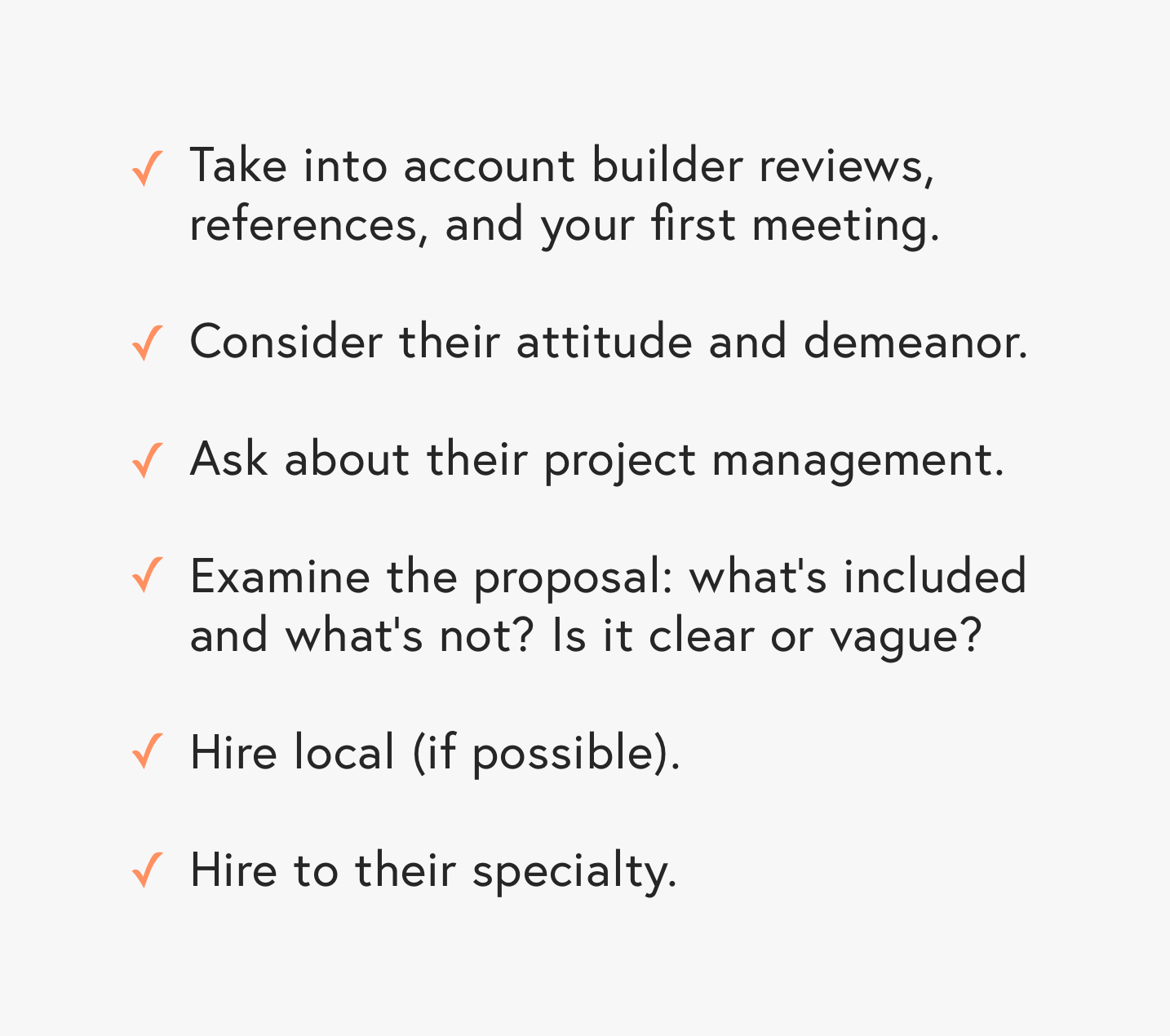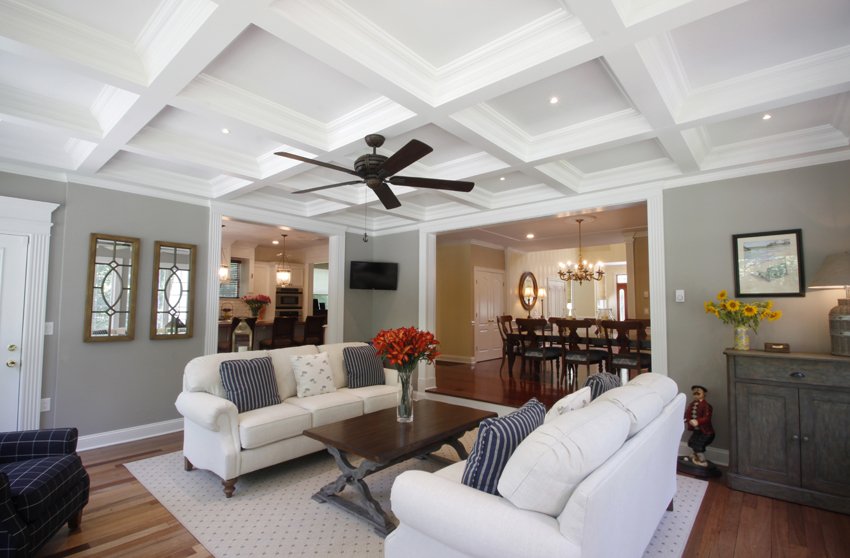How Do I Select the Best Builder?
We’ve all heard the horrible stories about cost overruns, delays and even “bait and switch” approaches to renovation projects. There are unscrupulous builders out there, but there are good ones with integrity too! We know, because we ARE one. Here’s some thoughts from a veteran about how to properly interview, qualify, and finally hire a great, experienced builder.
Check out my video where I explain what inspired me to write this article.
Before we begin, we know it’s going to take a little time and effort and a couple of the techniques in this article might even seem unconventional; but if you pay attention to these recommendations, you’ll get your chances of hiring a great builder or renovation specialist to as close to 100% as possible!
Where to Start:
1) REVIEWS & WEBSITE
Most clients will start the process of pre-screening who they would like to meet with via a review of the builder’s website and online reviews. A great starting point is to check Google reviews, reviews on Houzz.com as well as Angie’s list. Don’t just check the stars – read the review commentary. Do they mention workmanship, cleanliness, communication, integrity, delivering what is promised? Does the website exemplify professionalism and attention to detail?
2) FIRST CONTACT
Have your “radar” up from the moment you contact the builder. How long did it take to get an email reply? Did they pick up the phone when you called? Was there a live person answering? How long did it take to get a call back? You should get a response, no matter how you reached out by the next business day. Your experience from the very outset matters. If the builder spends some time discussing your needs on the phone prior to meeting, that’s a great sign. A great company is screening clients and projects for a good fit right at the “get-go” and there’s a feeling of desperation of ones that meet with anyone and everyone, pushing their “free estimate” slogan to the forefront. As the builder, I want to know what the project (kitchen, addition, windows, bathroom, full gut) is and what the needs are (Design? Construction? New Build?) so I can be prepared for the meeting.
Consider Prior to the initial consult:
3) REFERENCES
There is absolutely no substitute for talking with a couple of clients for whom the builder has worked! This is so essential that we recommend you take the trouble BEFORE you meet a builder or contractor. An email to references provided to contractors is okay, but a dialogue about their experience on the phone is the very best tool. Ask the person about the “sore points” – things that are a special concern to you - completion timeline, dust, attitude… You can pick up “vibes” or sticking points that came up in a telephone chat that the person might not put in writing. When you hear that hesitation or moment of dead air – follow up on it. Find out what the issue was – it’s probably about to be your issue!
Ask for References
There is absolutely no substitute for talking with a couple of clients for whom the builder has worked! This is so essential that we recommend you take the trouble BEFORE you meet a builder or contractor.
INITIAL CONSULT:
4) IN PERSON MEETING & ATTITUDE
You really need to like the person who will be in your home for weeks or months on a larger project! The first meeting should feel more like a consultation and a discussion of your needs and your project. Remember that the sales experience is likely to be your best experience – if the builder is gruff at the outset, it’s not going to get better during the stress of a construction phase. An expert builder should welcome your questions since it’s an opportunity to show and share his knowledge and they should have an experience based understanding of the client’s needs and concerns.
5) PROJECT MANAGEMENT
Some skilled craftsmen, though great at their craft, are not great project managers. It’s a very different skill set and completely essential to a smooth and timely construction project. Ask the builder about his project management style, how he prepares and stages his projects and specifically ask the references about the project management abilities.
A blank look or flustered words when asked how he manages projects is a major red flag! A good builder needs to be very tuned in to material and component lead times, skillfully pre-ordering things with long lead times, and setting the start date based on availability of the key components.
Let’s assume you’ve now met the builder and they’ve provided a proposal based on the design specifications/drawings. Let’s now consider:
1) QUALITY OF PROPOSAL
A high quality, knowledgeable builder should provide an itemized and detailed proposal. A $100k project with a 1 page proposal does not give enough information and leaves too much opportunity for springing “not included” items on the client during the renovation. A proposal that says “work per blueprints” is not enough. Even a good set of blueprints may not include molding profiles, wood species selections, finish types, etc. Look for exact language about what will be done:
Vague: Wood floors throughout home.
Clear language: Supply/install 2 ¼” select oak hardwood floors throughout 1st and 2nd floor except in tile areas with customer’s choice of stain and 3 coats of oil based polyurethane.
PROPOSAL LANGUAGE SHOULD BE CLEAR
A proposal should clearly indicate the method, style, and materials for your build or renovation.
Example: supply/install 2 ¼” select oak hardwood floor on 1st floor with nail-down installation.
2) WHAT’S NOT INCLUDED
Pay special attention to what is not included. Does the builder highlight for you what is not included and what will be your responsibility to purchase? Fixtures, cabinetry, appliances, etc. are not usually included in a builder’s proposal and this should be clear at the outset. A good builder should want this to be clearly highlighted to preserve a good relationship during the work and avoid any surprises or delays.


Here’s two more tips to consider:
HIRE LOCAL—This is for two reasons:
There is a cost associated with daily trips to the site from the business location. A good builder is naturally motivated to get work in a localized area of operations. It’s hard to be responsive to client needs, or other issues that come up if you are far away! I always wonder why a business located in one town would travel over an hour to another town to do business. Do they have a bad reputation locally? Why are they always working out of state? Are they a little desperate for clients?
A local contractor with experience knows the ins and outs of the local building department, is familiar with all local building codes and idiosyncrasies of each building department (believe me, they have them…) Building code enforcement is ENTIRELY done by the municipality. So when we say local, I’m not saying the business has to be based in your town, but ask if he’s done work in your town? Pro Tip: Ask specifically about their experience with your town’s building department.
HIRE THEIR SPECIALTY
Don’t hire your gardener to do your masonry project. Don’t bring the painter to do technical millwork even though he tells you he can do it… Don’t hire the flooring contractor to do your home renovation. You get the idea… Do you really want to be their first attempt at branching out? You wouldn’t ask your butcher to offer expert help on bread baking and pastry selections! There is so much to know in homebuilding, so hire a builder or renovation specialist for your build or renovation! You need a veteran who has the right team of specialists and knowledge base for your project, so don’t let the gardener convince you he can do your addition.
This leads us to:
BEWARE
Beware of a builder who says he’s an architect and a contractor, and an electrician etc. Or worse, they say you don’t need an architect, a designer, or specialists. Any renovation project of let’s say $25k and up requires a proper design phase for smooth execution. And nearly all renovation projects except millwork require proper licensed mechanical specialists. Watch out for dismissive phrases like “You don’t need a permit” or “I take care of everything”! The municipality where you live is the right place to find out whether you need a permit, not a smooth talking, cavalier carpenter.
PRICE
This subject is so important and sensitive, that we’ve put together several articles on this subject. But for now, just please note that it is LAST. What difference is it whether the price is right if the builder flunks out on pre-qualification tests? What good is any price if there is a good chance the project won’t come out good or may be left incomplete?


